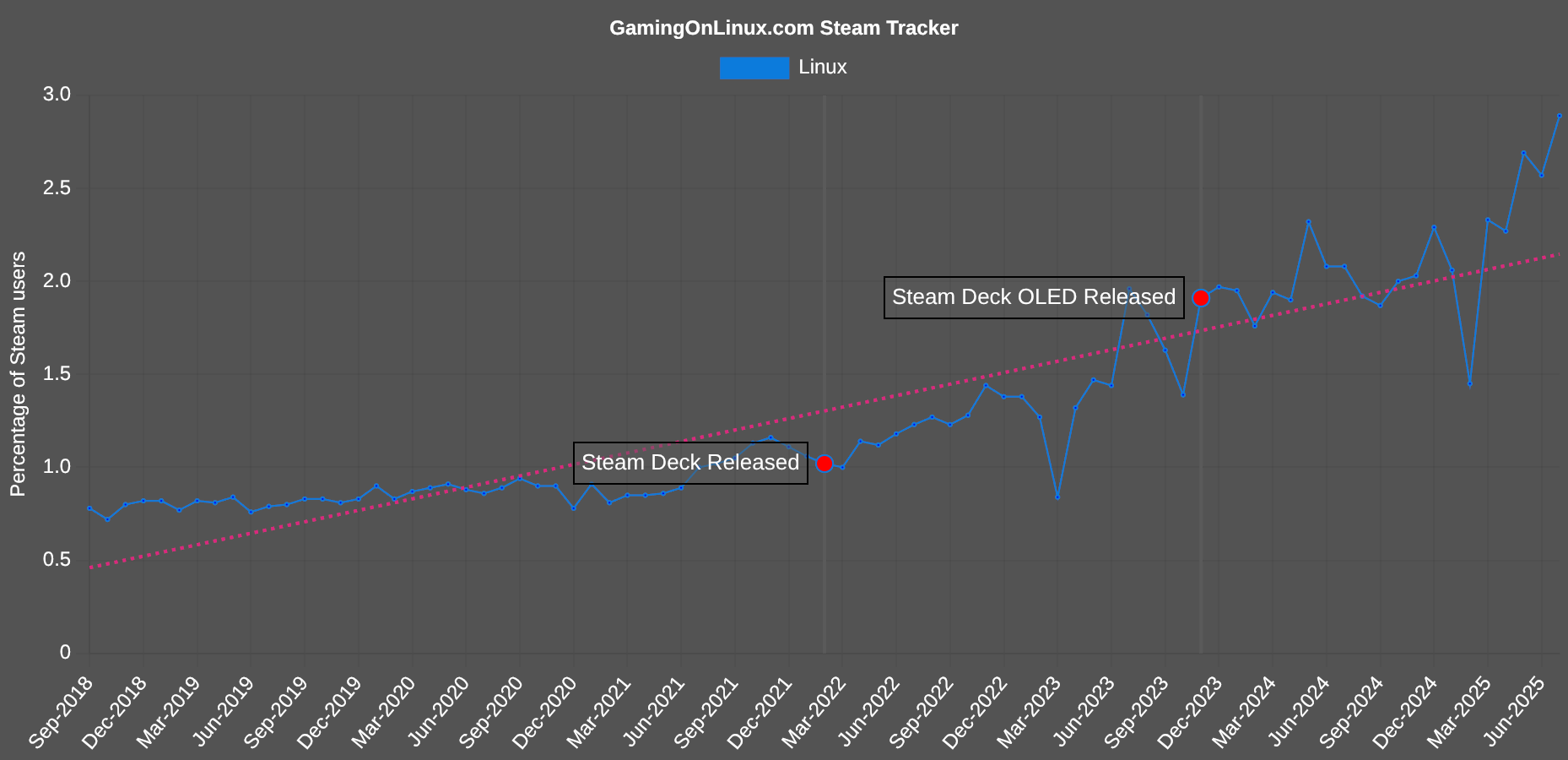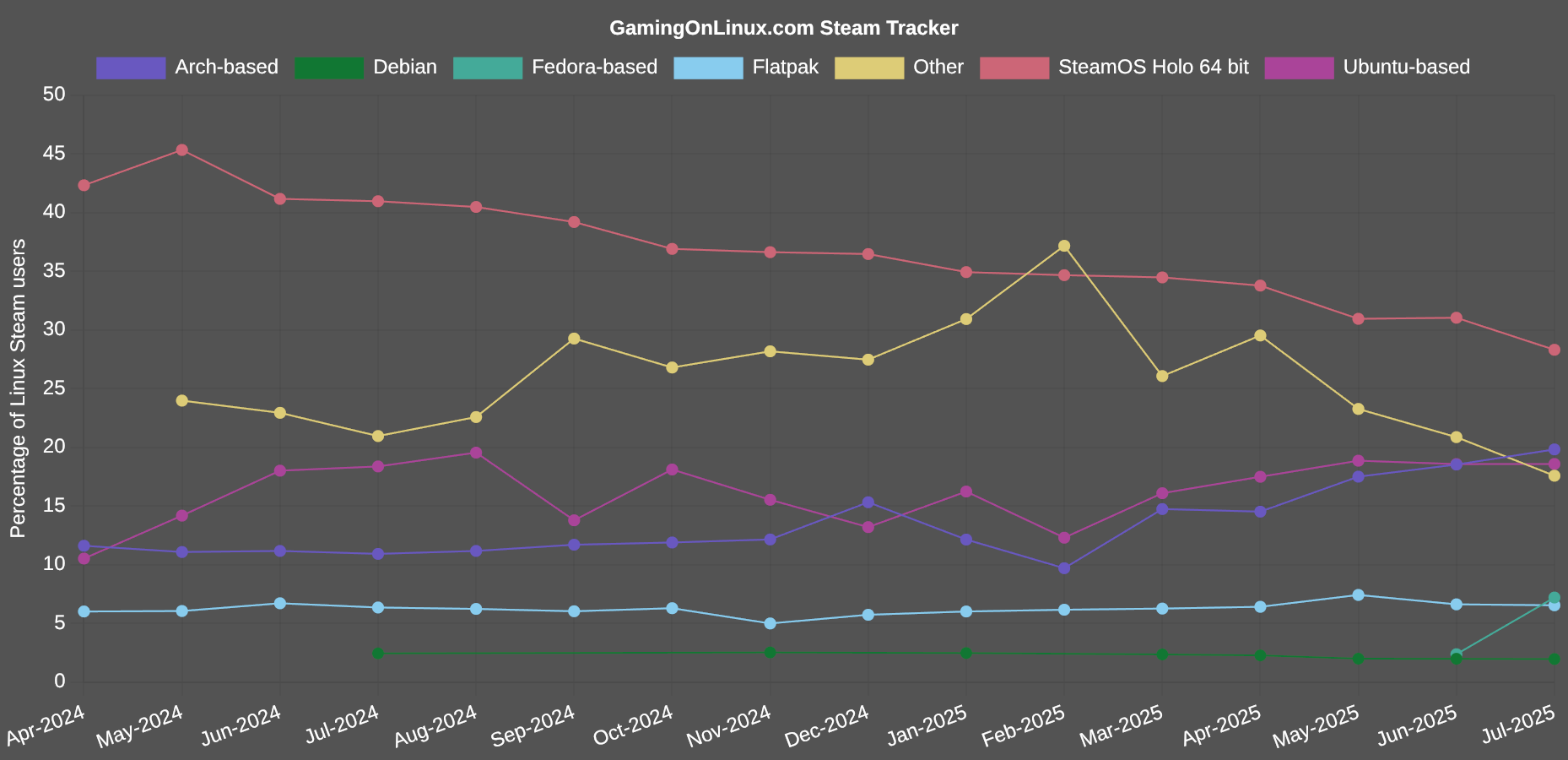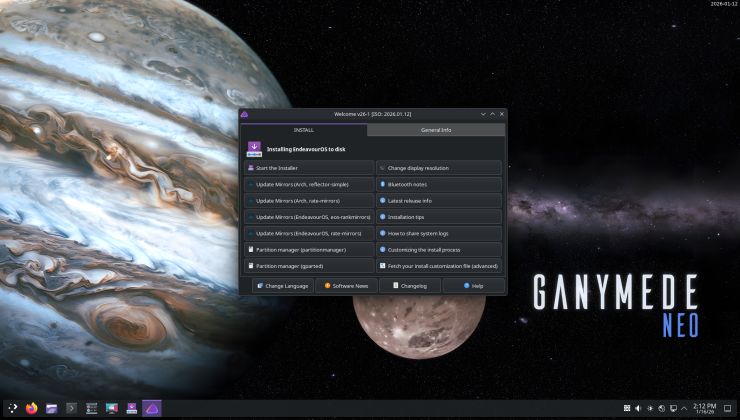Valve released the data for the Steam Hardware & Software Survey for July 2025, showing the Linux user share making gains towards hitting 3%.
We continue to see the slow but steady increase in the overall Linux user share on the desktop, good news for the health of the platform as more people realise just how good Linux is now.
Here's the current operating system share on Steam for July 2025:
- Windows 95.23% -0.44%
- Linux 2.89% +0.32%
- macOS 1.88% +0.12%
If you take a look at our dedicated Steam Tracker page for the charts, we can see that steady increase.
Plus the breakdown of Linux distributions that were popular across July 2025 on Steam. This is possibly the most expansive list Valve has given for the distribution breakdown yet.
- SteamOS Holo 64 bit 28.31% -2.73%
- Arch Linux 64 bit 10.82% +0.33%
- Linux Mint 22.1 64 bit 7.83% -0.07%
- Freedesktop SDK 24.08 (Flatpak runtime) 64 bit 6.54% -0.08%
- Ubuntu 24.04.2 LTS 64 bit 4.44% +0.23%
- CachyOS 64 bit 4.21% +1.03%
- Ubuntu Core 22 64 bit 4.17% -0.23%
- Bazzite 42 (FROM Fedora Kinoite) 64 bit 3.20% +0.83%
- Manjaro Linux 64 bit 2.46% 0.00%
- EndeavourOS Linux 64 bit 2.33% -0.07%
- Fedora Linux 42 (Workstation Edition) 64 bit 2.21% +2.21%
- Pop!_OS 22.04 LTS 64 bit 2.14% +0.08%
- Debian GNU/Linux 12 (bookworm) 64 bit 1.96% -0.02%
- Fedora Linux 42 (KDE Plasma Desktop Edition) 64 bit 1.79% +1.79%
- Other 17.58% -3.29%
And a snapshot again from our Steam Tracker with our combined distribution chart.
Source: Valve
For anyone wondering, Ubuntu Core means they installed steam with snap. In theory like Flatpak it could be any distribution but I expect 100% of these are ubuntu users that don't know better. (snap is not the recommended way).So, what would be the "recommended way"? I'm on Ubuntu and have Steam running as snap with no problems whatsoever (at least on par with my previous deb-installer-package). However it avoids all the i386 dependencies drawn in by the latter installation method.
And what's this condescending "Ubuntu users that don't know better"? I have been on a Linux desktops for 17 years now (which is actually longer than all the years spent on any Windows) - I'm pretty sure I know my way around in the Linux world.
https://www.gamingonlinux.com/2024/08/canonical-bring-more-steam-snap-improvements-also-hiring-more-desktop-software-engineers/
Pretty sure the snap version of Steam is better than the flatpak at this point, but if you want to avoid container issues entirely, then the website version is the way to go. You'll get any updates quickest that way too, as you don't have to wait for Canonical to update the snap after a new Steam release.
You'll get any updates quickest that way too, as you don't have to wait for Canonical to update the snap after a new Steam release.You really don't know how Steam works, do you?
It makes absolutely no difference if you've installed it via the distributions package, Flatpak or snap because the package is irrelevant for Steam updates (in its core, it's still a bad Windows software).
"So, what would be the "recommended way"? I'm on Ubuntu..."<snip>sudo apt install steam.
it doesn't install a snap(as of 25.04(just did a fresh install of it last weekend)). i purged snap/snapd and steam runs fine...
I've been dual booting from 1998 to 2014.i STOPPED dual booting in 98 and went fulltime linux after that code red fiasco.
I'm just wondering how many of these new Linux users are running old pcs that will be left unsupported by Win11, when Win10 will have been buried by Microsoft.Ah, but M$ is just discontinuing free support, not burying Win10. Win10 will be continuing, but you will have to pay for the support instead.
I keep getting these notifications on the Win10Pro systems at work telling me this.
I've been dual booting from 1998 to 2014.I went cold turkey in 2014 and ran Linux Mint exclusively for about 2 years after my HDD failed and the Windows backup wouldn't install (part of the backup was stored on the failed HDD -- brilliant idea, M$). I eventually had to reinstall Windows in a dual-boot after my preferred tax software stopped supporting WinXP on my old netbook. I maintain dual-boots on all my systems now but only use Windows for software that will not run on Linux.
Linux Mint 13 & LibreOffice showed me that Linux had become a serious contender against the M$ Windows behemoth. Linux has been my primary O/S ever since.
India ( 8.46% )
US ( 5.24% )
https://gs.statcounter.com/os-market-share/desktop/united-states-of-america
Europe ( 4.31% )
https://gs.statcounter.com/os-market-share/desktop/europe
World ( 3.9% )
We're on the right path, much thanks to everyone who has laid stones on this roadway to bliss.
The trendline does not fit. Maybe only take the last 3 years for a linear fit.
Maybe add a point when the Steam OS 3 was releaed for other devices.
sudo apt install steam.Well, yeah. No shit Sherlock. However, it doesn't install Steam either, since the package is called "steam-installer".
And it doesn't explain, why this is in any way "preferred" - unless you want to "just avoid snaps", which doesn't make a lot of sense when you are on Ubuntu (pick another distro then).
And as I already stated: The apt way will install another 169 packages. 169. This might be a different story, if Steam was a 64-bit application, but it isn't. And for me that's one of those situations where container solutions like flatpak or snap really shine. And since Steam is proprietary (just as most of my other snap packages) it is an even more fitting solution.
(And no, I apparently don't have a single i386 package installed, since my wine things are handled with bottles which again is a tidy flatpak.)
Well, yeah. No shit Sherlock. However, it doesn't install Steam either, since the package is called "steam-installer".have you conssidered less caffeine in your diet? big deal...169 packages...have you thought about getting off that 3 decade old 5GB HDD? when my steam Library is just shy of 4TB installed, the last thing i'm worried about is an additional 169 packages....
And it doesn't explain, why this is in any way "preferred" - unless you want to "just avoid snaps", which doesn't make a lot of sense when you are on Ubuntu (pick another distro then).
And as I already stated: The apt way will install another 169 packages. 169. This might be a different story, if Steam was a 64-bit application, but it isn't. And for me that's one of those situations where container solutions like flatpak or snap really shine. And since Steam is proprietary (just as most of my other snap packages) it is an even more fitting solution.
(And no, I apparently don't have a single i386 package installed, since my wine things are handled with bottles which again is a tidy flatpak.)
And it doesn't explain, why this is in any way "preferred" - unless you want to "just avoid snaps",Steam uses a number of commands from the running operating system to look at your hardware/software configuration (graphics card, window manager, IPC mechanism, etc.). All of these things are "obfuscated" when you run inside a container (snap, flatpak, etc.), which means that Steam is fed (somewhat) incorrect information about your system. _Usually_ this doesn't impact you, but sometimes it results in Steam (or the game inside Steam) making sub-optimal selections because the information it has available to it is incorrect. You see the same problem with Firefox running in a snap, it's why loading gnome extensions was broken for a very long time.
have you conssidered less caffeine in your diet? big deal...169 packages...have you thought about getting off that 3 decade old 5GB HDD? when my steam Library is just shy of 4TB installed, the last thing i'm worried about is an additional 169 packages....Really? All of a sudden 169 packages are something that goes without saying while at the same time snap packages are the source of all evil because they are oh so resource hungry.
And no: My rig has plenty of mass storage - still I'm in no need for 169 packages. And I can still remember it once got me into dependency hell when an i386 package was apparently out of sync with its AMD64 sibling...
Steam uses a number of commands from the running operating system to look at your hardware/software configuration (graphics card, window manager, IPC mechanism, etc.). All of these things are "obfuscated" when you run inside a container (snap, flatpak, etc.), which means that Steam is fed (somewhat) incorrect information about your system.What exactly are you referring to? The Steam Flatpak has access to all these information because almost all of the device tree is shared, only a small part is filtered due to security. It knows exactly what hardware I'm using, which window manager, etc..
The host system is obfuscated somewhat because a different root system is used. But this doesn't matter because it doesn't use much from the host except the kernel (whose version Steam exactly knows).
And it doesn't explain, why this is in any way "preferred"I know of two reasons: Valve recommends other ways, and when you're doing support on the Steam forums, problems due to Snap and Flatpak keep popping up.
Of course, if you know what you're doing and can help yourself, use whatever floats your boat.
Really? All of a sudden 169 packages are something that goes without saying while at the same time snap packages are the source of all evil because they are oh so resource hungry.I would be very surprised if there's no similar amount of libs provided by some Snap package your Steam package is depending upon.
And no: My rig has plenty of mass storage - still I'm in no need for 169 packages. And I can still remember it once got me into dependency hell when an i386 package was apparently out of sync with its AMD64 sibling...
I would be very surprised if there's no similar amount of libs provided by some Snap package your Steam package is depending upon.Steam snap relies on
gaming-graphics-core22 (which snaps kisak-fresh) and gtk-common-themes (the latter one is shared among several snaps).















 How to setup OpenMW for modern Morrowind on Linux / SteamOS and Steam Deck
How to setup OpenMW for modern Morrowind on Linux / SteamOS and Steam Deck How to install Hollow Knight: Silksong mods on Linux, SteamOS and Steam Deck
How to install Hollow Knight: Silksong mods on Linux, SteamOS and Steam Deck